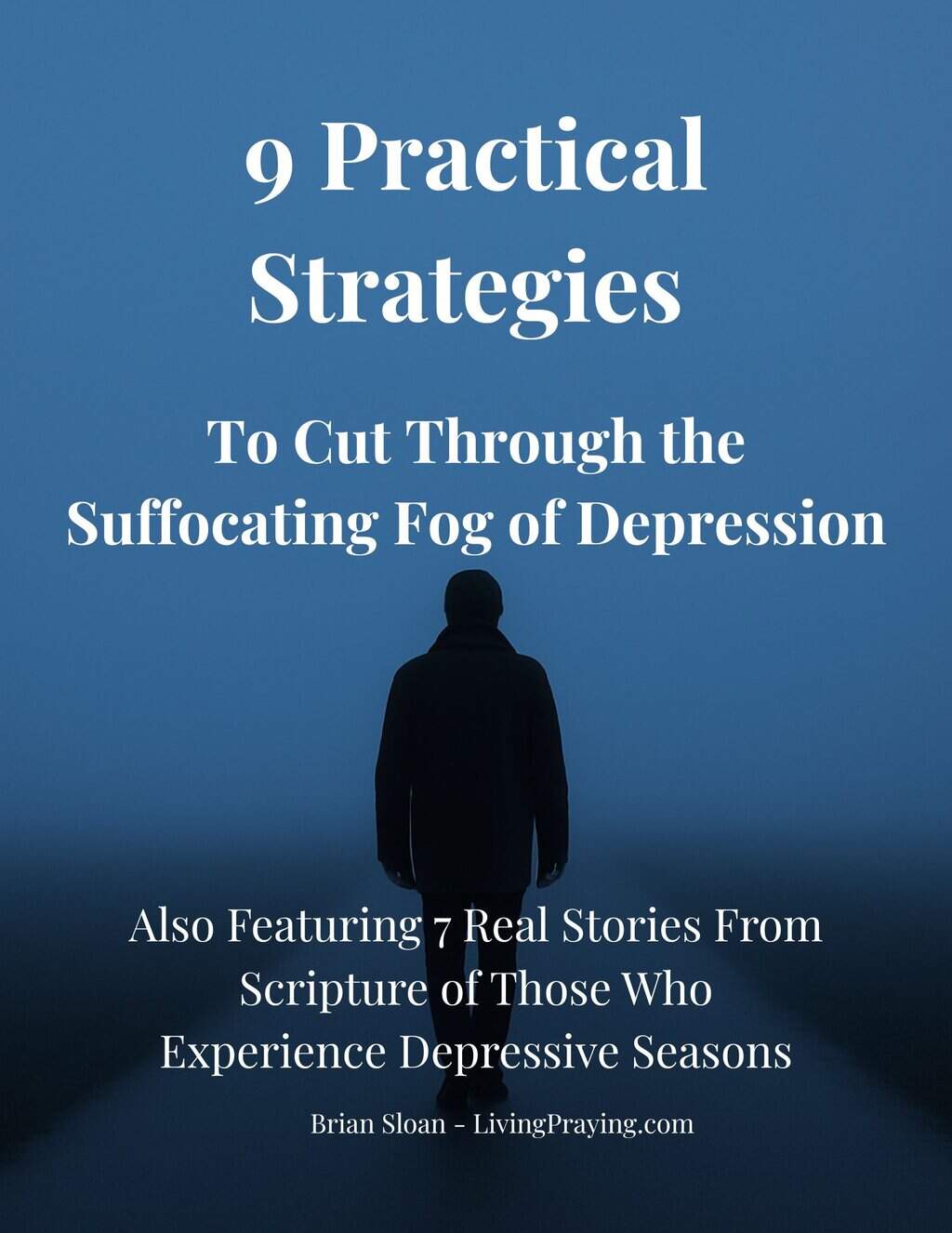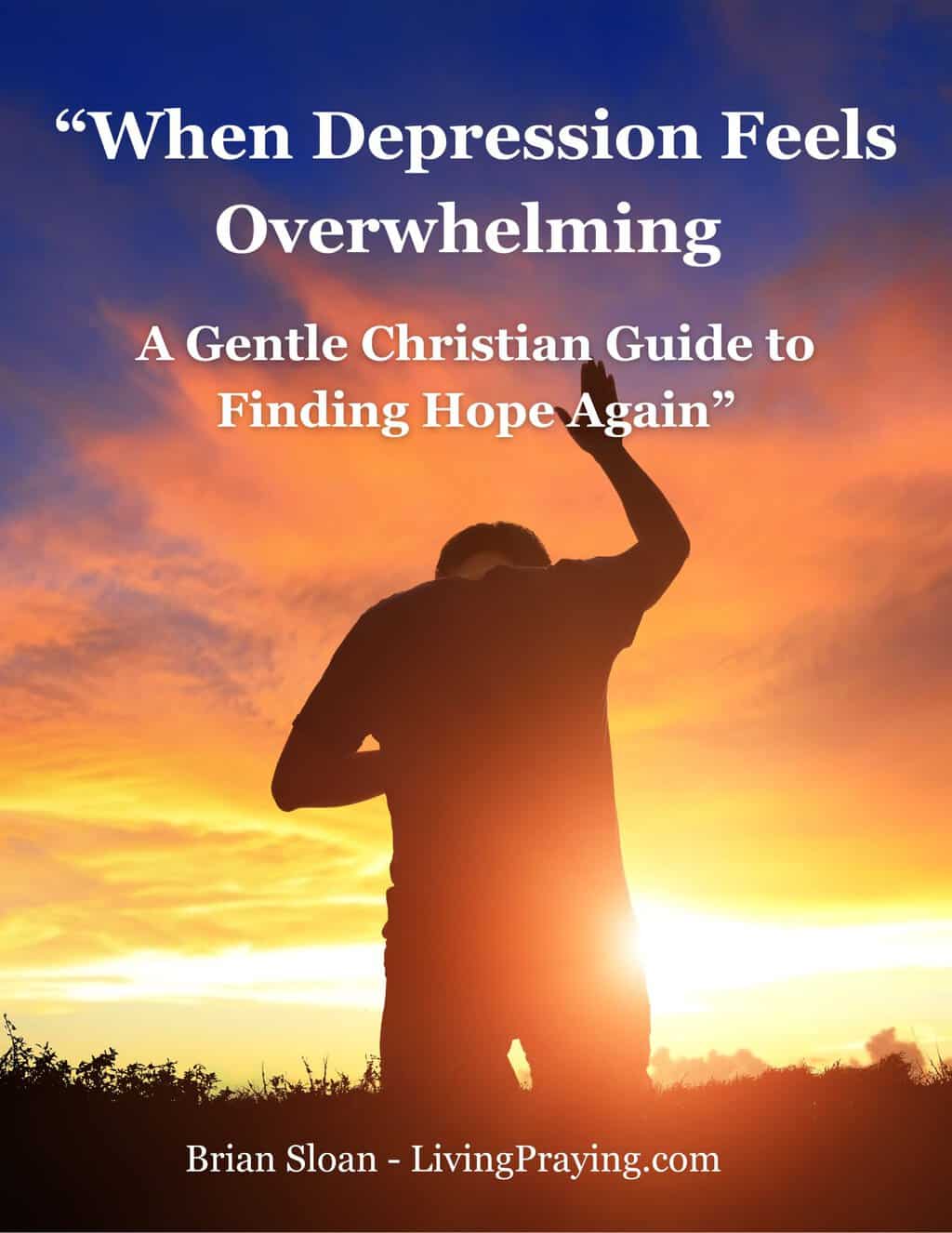Introduction: Christians and Depression—The Truth in Perspective
Let’s be honest—depression is a difficult, painful battle, and many Christians struggle with it, even those who are deeply committed to their faith. From a Christian perspective on depression, the struggle is real, deeply human, and never a sign that God has abandoned you.
This article explores the biblical relationship between faith and depression. For a broader collection of resources—including Scripture, life-stage support, and practical encouragement—visit our Christians and Depression Resource Hub.
Christians and depression may seem like they shouldn’t go together, but the reality is that many faithful believers have faced this struggle. I know this firsthand. As a Christian minister, I have walked through the darkness of severe depression not once, but twice—first in 1987 and again in 2015. There was no major crisis in my life at the time. No catastrophic failure. Just a deep, unexplainable sorrow that I couldn’t shake.
Why did it happen? I don’t fully know. My doctor pointed out that depression often runs in families, and that’s true for me—family members going back generations have faced mental health struggles. Medical research tells us that factors like chemical imbalances, medical conditions, and mood disorders contribute to depression. Many believers look for biblical help for depression, wanting to know how faith and Scripture speak into their pain. And yes, spiritual struggles, a lack of faith, or disobedience to God can definitely play a big role. But let’s be clear—Walking with Christ and depression are not mutually exclusive. Depression is not always the result of sin, and it is not a sign that someone is a weak Christian.
Here’s what I do know: the worst thing you can do is hate yourself for being depressed. Shame and self-condemnation will only pull you deeper into despair. Instead, I want you to hear this—there is hope. Jesus Christ loves you, and He has not abandoned you. Many of the greatest figures in the Bible, including King David, Elijah, and the apostle Paul, battled depression. You are not alone.
Have We Given Our Lives To Jesus
For those searching for what the Bible says about depression, there is more hope in Scripture than many realize. But before we go any further, I need to ask: Have you given your life to Jesus Christ? The first and most important step in healing is receiving Him as Lord and Savior. Without Christ, life will always feel empty. But in Him, there is true, lasting hope—even in the midst of depression.
In this post, we’ll explore the causes of depression, biblical truth about mental health, and practical ways to find hope and healing. Along the way, I hope you’ll find genuine Christian encouragement for depression grounded in the truth of God’s Word. Christians and depression may be a difficult topic, but there is real hope for those who trust in Christ. Let’s walk this road together.
If you’re feeling emotionally worn down, stuck, or spiritually distant, this Christ-centered bundle includes a full devotional guide (9 Practical Strategies to Cut Through the Fog of Depression) plus a short companion PDF for moments when the heaviness feels overwhelming. Gentle, Scripture-rooted help for taking one small step forward.
Related Encouragement
Section 1: The Reality of Depression in the Christian Life
If you’ve ever battled depression, you might have asked yourself, “Why me? If I love God and try to follow Him, why am I struggling like this?” You’re not alone in these questions. Many faithful Christians have wrestled with deep sorrow, and some of the greatest figures in biblical history and church history have walked through depression.

Depression is not just a modern issue or a sign of weak faith. It is a reality that has touched the lives of church leaders, biblical figures, and strong Christians throughout history.
Biblical Examples of Depression
The Bible does not shy away from the struggles of mental health issues. Some of the greatest men of faith faced overwhelming despair:
- King David – This was a man after God’s own heart, yet he experienced deep sorrow and inner turmoil. In Psalm 42:5, he cries out, “Why, my soul, are you downcast? Why so disturbed within me?” He wrestled with grief, fear, and loneliness. In Psalm 13:2-4, he pleads with God, asking how long he must endure suffering.

- Elijah – This mighty prophet had just witnessed one of the greatest victories in biblical history when God sent fire from heaven in a showdown with the prophets of Baal (1 Kings 18). But shortly after, Elijah fell into despair and wanted to die. In 1 Kings 19:4-5, he says, “I have had enough, Lord. Take my life.” Even after witnessing God’s power, he felt hopeless.
- Apostle Paul – If anyone had unwavering faith, it was Paul. Yet even he faced crushing despair. In 2 Corinthians 1:8, he admits, “We were under great pressure, far beyond our ability to endure, so that we despaired of life itself.” Paul, the great missionary and writer of much of the New Testament, knew what it was like to feel overwhelmed.
If you’re hurting right now, you’re not alone. Many sincere Christians battle depression — and God’s love for you has not changed one bit. Sometimes it helps simply to pause, breathe, and let Scripture remind you of what your emotions may have trouble believing.
I created a free devotional guide for moments like this. If you need encouragement today, you can download it here-
Historical Christian Examples of Depression
Depression has also affected some of the most influential Christian leaders in history.
- Charles Spurgeon – Known as the “Prince of Preachers,” Spurgeon was one of the greatest ministers of the 19th century. Yet, he battled severe depression throughout his life. He once said, “I could weep by the hour like a child, and yet I knew not what I wept for.” Despite his struggles, God used him mightily, and his sermons on suffering have brought comfort to millions.
If these faithful men of God experienced mental health struggles, then it’s clear that depression is not a sign of spiritual failure.
Understanding the Causes of Depression
Depression does not have a single cause. It is often the result of a combination of factors, including:
- Chemical imbalance – The brain’s chemistry plays a major role in mental health. A lack of certain neurotransmitters can contribute to depression.
- Life circumstances – Grief, trauma, stress, or personal loss can trigger depression.
- Spiritual struggles – Feeling distant from God or wrestling with questions of faith can contribute to a sense of despair.
- Medical conditions – Chronic illness, hormonal imbalances, and other physical health issues can lead to depression.
- Mental health issues – Some forms of depression are linked to mood disorders, requiring medical or professional care.

Recognizing that depression has multiple causes can help remove the stigma often associated with it. It is not always a matter of simply “thinking positively” or “having more faith.” Understanding this can free us to seek both spiritual and practical solutions for healing.
In the next section, we’ll dive deeper into these causes and explore what the Bible says about depression, hope, and healing.
Section 2: Understanding the Causes of Depression
Depression is not a one-size-fits-all condition. While some people experience it due to life circumstances, others battle it because of biological or spiritual struggles. Understanding the different causes of depression can help remove guilt and provide clarity for those seeking healing. Christians and depression is a topic that needs to be addressed with both biblical truth and practical wisdom, recognizing that multiple factors can contribute to this struggle.
1. Physical and Medical Causes
Some people mistakenly believe that depression is purely a spiritual issue or a lack of faith. While faith plays a significant role in healing, we cannot ignore the physical aspects of depression. Clinical depression is not just an emotional state—it can be a medical condition that requires professional care.
Mood disorders, medical conditions, and chemical imbalances in the brain can contribute to depression. When certain neurotransmitters like serotonin or dopamine are low, it can lead to persistent sadness, fatigue, and anxiety.
Antidepressant medication can be a useful tool in restoring balance. Some Christians hesitate to seek medical help, thinking it shows a lack of trust in God. But taking medication for depression is no different from taking insulin for diabetes—it addresses a legitimate medical need.
The American Psychiatric Association and the National Institute of Mental Health recognize that depression is a serious condition, affecting millions of people worldwide. Seeking treatment does not mean you are weak—it means you are taking steps toward healing.
2. Spiritual and Emotional Causes
While depression has biological causes, spiritual and emotional struggles can also contribute.
Sin and guilt – While not all depression is caused by sin, unresolved guilt can weigh heavily on the soul. Psalm 32:3-4 describes how David felt when he had unconfessed sin: “When I kept silent, my bones wasted away through my groaning all day long.” If you are struggling with guilt, know that God offers full forgiveness through Jesus Christ.
Cognitive distortions – These are lies we believe about ourselves, our worth, and even about God. Thoughts like “I’m worthless” or “God doesn’t love me” can fuel depression.
Spiritual condition and faith struggles – Feeling distant from God or questioning His presence can make depression feel even more overwhelming. But God’s presence is not based on our emotions—it is a constant reality, even when we don’t feel it. Deuteronomy 31:8 assures us, “The Lord himself goes before you and will be with you; he will never leave you nor forsake you.”
3. Family History and Genetics
Depression is often influenced by family history. If your family members have struggled with depression, you may be more susceptible to it as well. Christians and depression can sometimes feel like a generational battle, but understanding the role of genetics and family history can remove unnecessary guilt.
A person’s DNA, brain changes, and chemical reactions play a significant role in mental health. While this does not mean you are destined to have depression, it does mean that some people are biologically more prone to it than others.
Understanding that depression has genetic components can remove unnecessary guilt. It is not a sign of weak faith—it is often a medical condition, just like high blood pressure or heart disease.
Recognizing the different causes of depression helps us approach healing with wisdom. In the next section, we’ll look at what the Bible says about depression and the hope we have in Christ.
Section 3: What the Bible Says About Depression and Hope in Christ
For many Christians struggling with depression, one of the hardest questions is, “Where is God in all of this?” It can feel like He is distant or silent in our pain. But the Bible speaks directly to those battling mental health struggles, offering assurance that God is near, that He understands, and that there is hope in Him. Christians and depression is a topic that the Bible does not ignore—God’s Word provides comfort and truth for those walking through this battle.
God’s Promises in Depression
The Bible is filled with promises for those experiencing sorrow and despair.
God’s Word reminds us that He is not far away from the brokenhearted. Psalm 34:18 says, “The Lord is close to the brokenhearted and saves those who are crushed in spirit.” If you are in a season of deep sadness, know that God is near.
God’s love does not change based on how we feel. Depression can make it seem like we are unloved, but Romans 8:38-39 assures us that nothing—not even our emotions—can separate us from His love.
Jesus Christ understands our suffering. Isaiah 53:3 describes Him as “a man of sorrows, acquainted with grief.” He knows what it feels like to experience pain, rejection, and despair. When we feel alone, we can remember that Christ Himself walked through suffering.
The Presence of God Brings Peace
One of the greatest sources of hope in depression is knowing that we are never truly alone. The Holy Spirit is our Comforter, given to us to provide peace even in the midst of our struggles. John 14:16-18 records Jesus saying, “I will ask the Father, and He will give you another advocate to help you and be with you forever—the Spirit of truth.”
While depression can make us feel disconnected from God, we must remember that His presence is not based on our emotions. Even when we do not feel Him, He is still there. Christians and depression may seem like a contradiction, but God has repeatedly shown throughout Scripture that His people can face suffering and still be deeply loved and cared for by Him.
Faith Is Not the Absence of Struggle
Too often, people believe that strong Christians should never experience depression. Some even think that having mental health struggles means they do not have enough faith. But this is simply not true.
Many faithful believers, including biblical figures like Elijah, David, and Paul, battled despair. Struggling with depression does not mean you have failed in your faith. If anything, it can be a time when God draws you closer to Him, teaching you to rely on His strength.
In the next section, we will explore practical steps Christians can take to walk through depression with hope and wisdom.
Section 4: Practical Steps for Christians Battling Depression
When struggling with depression, it can feel like you’re stuck in a never-ending cycle of sadness, exhaustion, and hopelessness. But while depression is a difficult battle, there are practical steps you can take to navigate it with faith and wisdom. Healing is often a journey that includes both mental health professionals and spiritual disciplines, recognizing that God cares about our whole being—body, mind, and spirit. Christians and depression is a reality many believers face, but God provides wisdom and resources to help us heal.
1. Seek Professional Help
One of the most important things a Christian can do when battling depression is to seek professional help. While prayer and faith are essential, they are not a substitute for medical care.
Mental health professionals are a gift from God, equipped to help those who are struggling. Seeking therapy or medical treatment is not a sign of weak faith—it is an act of wisdom.
Medical help may include counseling, therapy, or even antidepressant medication. Some Christians hesitate to take medication, fearing it shows a lack of trust in God. But just as we would take medicine for high blood pressure or diabetes, we should not hesitate to seek medical treatment for depression if needed.
Christian counseling can be especially beneficial, as it combines psychological wisdom with biblical truth. Christians and depression should not be handled alone—seeking help is a step toward healing, not a lack of faith.
2. Take Care of Your Physical Health
Depression does not only affect the mind—it affects the body as well. Taking care of your physical health can make a significant difference in how you feel.
Eat well, rest, and exercise – Your body is the temple of God (1 Corinthians 6:19-20), and caring for it honors Him.
Sleep impacts mental health issues – Poor sleep can worsen depression, while consistent rest can help the brain function properly.
A holistic approach to healing—treating the mind, body, and spirit together—can be one of the most effective ways to improve mental health. Many people with depression also struggle with other medical conditions, such as chronic pain or hormonal imbalances, which should not be ignored when seeking treatment.

3. Engage in Spiritual Disciplines
Depression can make it difficult to pray or read the Bible, but staying connected to God through spiritual disciplines can provide strength and hope.
Prayer and Bible reading – Romans 12:2 reminds us to renew our minds, and reading God’s Word can help counter the lies of depression.
Worship – Even when you don’t feel like it, worshiping God can shift your focus off your pain and onto His faithfulness. Psalm 42:11 says, “Why, my soul, are you downcast? Put your hope in God, for I will yet praise Him.”
Spending time in Christian community – Depression often tempts people to isolate themselves, but staying connected with other believers provides encouragement and accountability. Church leaders and fellow Christians can be a crucial source of support during difficult times.
4. Recognize and Reject Lies About Depression
Many Christians struggle with guilt and shame about their depression because of false beliefs. It’s important to reject these lies and embrace the truth.
Depression does not mean you lack enough faith – Many strong believers, including biblical figures, struggled with despair.
It does not mean God has abandoned you – Feelings of loneliness do not change the reality of God’s presence in your life.
It is not always due to sin or a spiritual condition – While sin can contribute to depression, many cases have medical or genetic causes. The reality is that some individuals are more prone to depression due to a chemical imbalance, which is not a reflection of their faith or obedience to God. Christians and depression can coexist, and struggling does not mean you are failing in your walk with Christ.
Taking these practical steps does not guarantee that depression will disappear overnight, but they can help you move toward healing. In the next section, we will explore how to find encouragement even in the darkest times.
Section 5: Encouragement for Those Who Feel Hopeless
When depression lingers, it can feel like things will never get better. The enemy loves to whisper lies—telling you that you’re alone, that you’re beyond help, or that you’ll never experience joy again. But none of that is true. Depression is not the end of your story—there is hope in Christ Jesus.
God’s Strength in Your Weakness
Even in the darkest moments, God is still working. He can take your pain and use it for His glory. 2 Corinthians 12:9-10 reminds us of this truth:
“But he said to me, ‘My grace is sufficient for you, for my power is made perfect in weakness.’ Therefore, I will boast all the more gladly about my weaknesses, so that Christ’s power may rest on me.”
You may not see it now, but God can use this struggle to deepen your faith, increase your compassion for others, and draw you closer to Him. Many believers who have battled depression have found that, in time, their pain became part of their testimony, helping others who are suffering. Christians and depression is a reality many face, but God is still present in the midst of it.
You Are Not Alone
One of the hardest parts of depression is feeling isolated. But countless believers have faced depression and found healing. Their testimonies serve as a reminder that God is still in the business of restoring lives.

If you feel alone, don’t stay silent. Reach out to church leaders or a trusted friend for prayer and support. Sometimes, just sharing your burden with someone else can bring relief.
Hold on to this truth: God has not abandoned you. He is walking with you, even when you can’t feel it. Christians and depression may be a difficult combination to navigate, but depression does not define you—God’s love does.
Conclusion: You Are Not Alone—Jesus Christ Is with You
If you take one thing away from this, let it be this: Christians and depression are not mutually exclusive. Many faithful believers have walked this difficult road, but there is hope. Depression does not mean you are failing as a Christian, nor does it mean God has abandoned you. His love remains constant, even when your emotions tell you otherwise.
No matter how dark things feel, God’s presence is with you. Deuteronomy 31:8 reminds us, “The Lord himself goes before you and will be with you; he will never leave you nor forsake you. Do not be afraid; do not be discouraged.” You are never alone, even when depression tries to convince you otherwise.

If you have never surrendered your life to Jesus Christ, now is the time. He is the ultimate source of healing, peace, and salvation. Depression may feel overwhelming, but in Christ, there is eternal hope. He offers rest to the weary, comfort to the brokenhearted, and strength to those who feel weak.
For those already walking with Christ, remember that mental health struggles do not define you—God does. Seeking professional help, engaging in spiritual disciplines, and leaning on church leaders for support are not signs of weakness but steps of faith. Healing is possible, and God is with you in every step of the journey.
Christians and depression may be a reality, but so is God’s unchanging love. Keep holding on—He will never let you go.



Leave a Reply